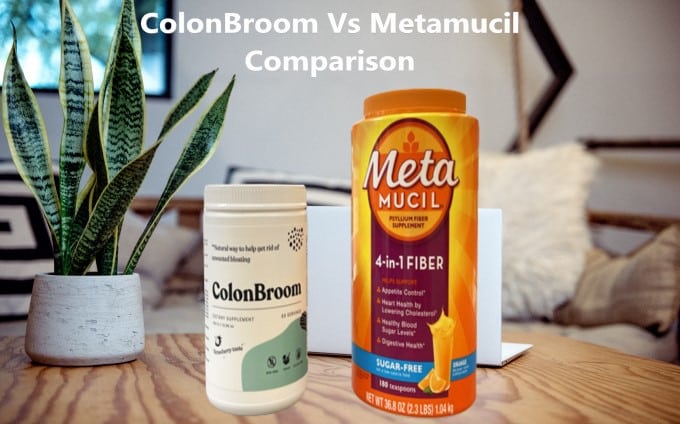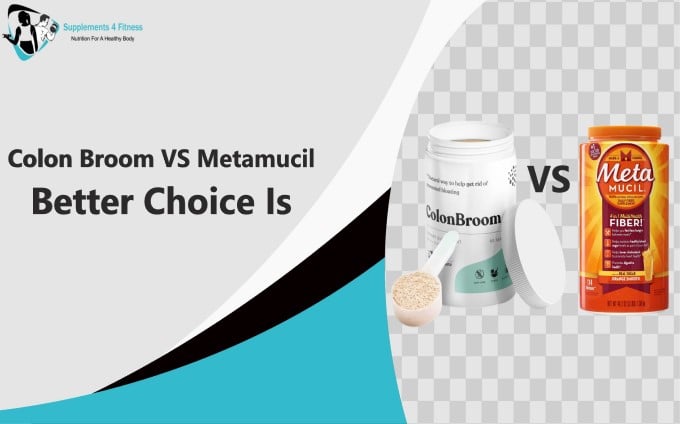Maintaining good colon health is essential for overall well-being, and fiber supplements are a popular choice for those looking to improve digestion, regulate bowel movements, and support gut health. Two of the most well-known options on the market are Colon Broom and Metamucil—but how do they stack up against each other?
As a registered dietitian who’s worked extensively with patients experiencing digestive issues, I understand the value of a good fiber supplement. While lifestyle and dietary improvements should always come first, supplements can provide that additional support some people need.
In this article, we’ll compare Colon Broom and Metamucil across multiple factors—including ingredients, effectiveness, taste, side effects, and cost—so you can make a more informed choice.
Colon Broom vs Metamucil: At a Glance
Both Colon Broom and Metamucil use psyllium husk as their primary ingredient, a soluble fiber known for improving digestion and relieving constipation. However, they differ in other key ways—especially in terms of formulation, sweeteners, and additional ingredients.
Psyllium husk, the key ingredient in both products, is a well-researched source of soluble fiber. It has been shown to improve bowel regularity, support heart health, and help manage blood sugar levels. (Medical News Today)
Quick Verdict:
While both are effective, Colon Broom may appeal more to those looking for a cleaner, plant-based formulation without artificial additives. Metamucil, however, offers a more affordable and widely available option with a long track record.

What Is Colon Broom?
Colon Broom is a fiber supplement marketed as a natural colon cleanser. Its primary ingredient is psyllium husk, which helps soften stool, support regular bowel movements, and reduce bloating. The product is flavored naturally with stevia and includes citric acid and sea salt, the latter of which may support hydration.
Colon Broom’s use of sea salt may support hydration and electrolyte balance, particularly helpful for those with digestive issues. (Healthline)
Colon Broom is free from artificial sweeteners, additives, and colorants, which may make it more appealing for those seeking a more natural product. Unlike synthetic sweeteners, stevia—used in Colon Broom—is a natural, plant-based alternative that may help regulate blood sugar and reduce cravings. (WebMD)
Recommended Use: One scoop mixed with water, taken twice daily, preferably on an empty stomach.
Pros
-
Made with natural ingredients and sweeteners
-
May support bowel regularity and relieve constipation
-
Reported to reduce bloating and improve satiety
-
Contains no added sugars or artificial ingredients
Cons
-
Higher price point
-
Not suitable during pregnancy or breastfeeding
-
May cause temporary digestive discomfort when first used
What Is Metamucil?
Metamucil has been on the market since 1934 and is backed by decades of use. Like Colon Broom, it uses psyllium husk as its main ingredient, but many of its formulations contain artificial sweeteners like sucralose, aspartame, and maltodextrin, as well as artificial colors like yellow 6.
It’s essential to note that certain studies have linked manufactured citric acid—found in some Metamucil formulations—to potential inflammatory responses, such as joint pain and irritable bowel symptoms. (Sweis & Cressey, 2018)
Also, Artificial sweeteners like aspartame and sucralose, found in Metamucil, have been linked to gastrointestinal distress and potential long-term metabolic effects. (Journal of Neurogastroenterology and Motility, 2016)
However, the brand has responded to consumer concerns in recent years by introducing “premium” versions that use natural flavors and sweeteners.
Available Formats: Powder, capsules, and gummies.
Recommended Use: Up to three servings per day, mixed with at least 8 ounces of water.
Pros
-
Widely available and cost-effective
-
Multiple forms and flavors
-
May support blood sugar and cholesterol management
-
Long-standing market trust
Cons
-
Some versions contain artificial sweeteners and dyes
-
May not suit keto or fasting diets
-
Can cause gas, bloating, or discomfort in some users
Ingredient Comparison
| Ingredient | Colon Broom | Metamucil |
|---|---|---|
| Psyllium Husk | ✔️ | ✔️ |
| Sweetener | Stevia (natural) | Sucralose, Aspartame (artificial) |
| Flavoring | Natural strawberry | Artificial orange (in some types) |
| Additional Ingredients | Sea salt, citric acid | Maltodextrin, yellow 6 (in some) |
| Sugar-Free | ✔️ | Depends on formulation |
Colon Broom takes a minimalist, natural approach with fewer ingredients. Metamucil offers more variety but sometimes at the cost of including synthetic components.
Benefits Comparison
Both supplements aim to:
-
Improve digestion and bowel regularity
-
Increase daily fiber intake
-
Support cardiovascular health
-
Contribute to blood sugar control
Unique to Colon Broom:
-
Often preferred for its natural formulation
-
Some users report reduced sugar cravings
-
Offers a digital tracking app for gut health
Unique to Metamucil:
-
More affordable and accessible
-
Long-term user base and clinical use history
-
Available in multiple delivery formats
Taste & User Feedback
Colon Broom:
-
Flavor: Strawberry (or tropical)
-
Sweetener: Stevia
-
Common Reviews: Pleasant, juice-like taste; mixes well with smoothies
Metamucil:
-
Flavor: Orange, berry, apple crisp (varies)
-
Sweetener: Artificial (in some versions)
-
Common Reviews: Tang-like flavor; may form clumps if not consumed quickly
Winner on Taste: Many consumers find Colon Broom more palatable due to its natural flavor and sweetener.
Potential Side Effects
Both products may cause temporary digestive changes, especially during the first few days of use:
-
Gas or bloating
-
Cramping
-
Loose stools or constipation (paradoxical)
Allergy Alert: Some people may be sensitive to psyllium or added ingredients like strawberry flavoring, maltodextrin, or food dyes.
If you notice signs of an allergic reaction (itchy skin, rash, shortness of breath), discontinue use and consult a doctor.
Pricing Comparison
| Product | Price Range Per Serving |
|---|---|
| Colon Broom | $0.47 – $1.17 (bulk or subscription) |
| Metamucil | $0.16 – $0.42 (formulation-dependent) |
Metamucil is generally more budget-friendly, especially in capsule or gummy form. Colon Broom is a premium-priced product, with a focus on clean ingredients.
Final Verdict: Colon Broom or Metamucil?
Choose Colon Broom if you:
-
Prioritize natural, additive-free ingredients
-
Want a mild laxative effect that supports weight management
-
Prefer a digital health-tracking experience
-
Don’t mind spending more for a premium product
Choose Metamucil if you:
-
Are looking for an affordable and time-tested fiber supplement
-
Want a variety of formats (powder, capsule, gummy)
-
Don’t have sensitivities to artificial sweeteners
Both are effective fiber supplements, but Colon Broom offers a cleaner formulation with added modern appeal. Still, Metamucil remains a reliable choice with broader accessibility and cost efficiency.
You might want to check other comparisons of gut health supplements:
- Bioma vs Provitalize: Better for Gut Health and Weight Loss?
- Happy Mammoth Vs Provitalize: Hormone and Gut Health Winners?
FAQs
Q: Which supplement is more effective for constipation?
A: Both are effective, but Colon Broom’s higher fiber content per serving and natural ingredients give it a slight edge for some users.
Q: Are there side effects to worry about?
A: Mild digestive discomfort is possible with either product. These effects often subside as your body adjusts.
Q: Can I use both products together?
A: It’s not recommended to use both simultaneously without guidance from a healthcare provider.
Q: Which one tastes better?
A: Many users prefer the natural strawberry flavor of Colon Broom over Metamucil’s synthetic orange taste.
Q: Is one better for weight loss?
A: Colon Broom may help reduce appetite slightly more due to its higher fiber content and satiety effect.
Final Thoughts
Whether you choose Colon Broom or Metamucil, both can be valuable additions to your digestive health regimen. The right pick depends on your budget, ingredient preferences, and personal health needs. Always consult a healthcare professional before adding new supplements to your routine.

